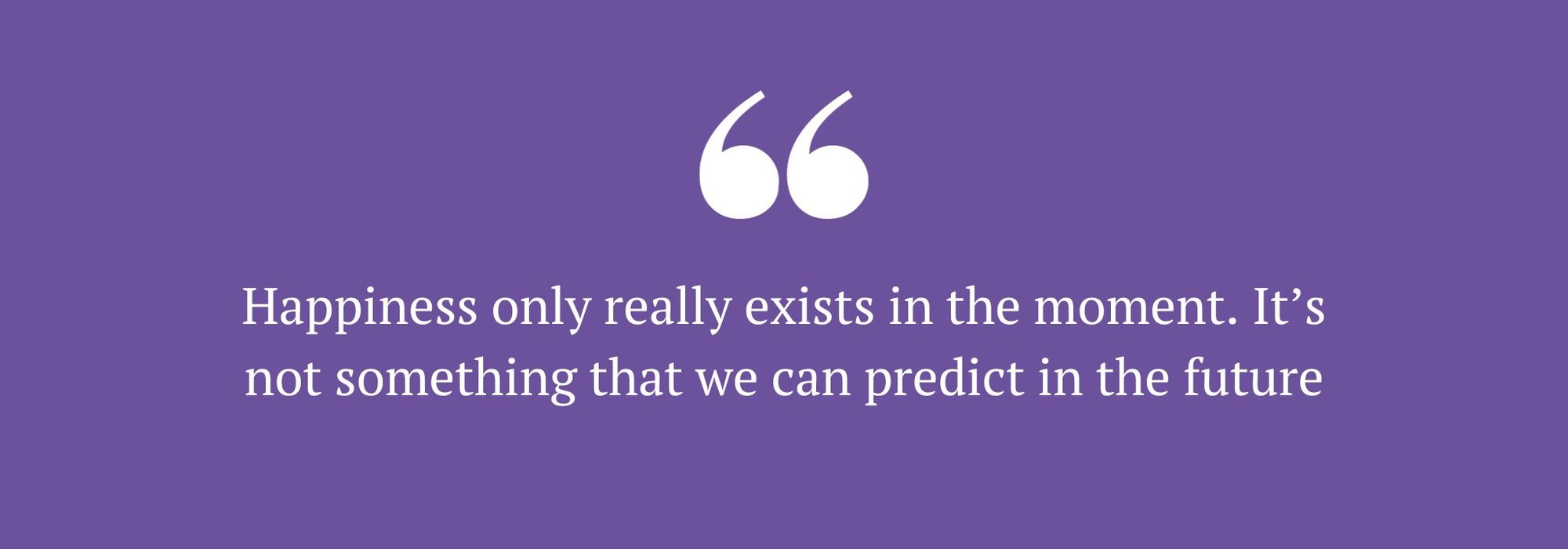Is happiness something you see waiting for you on the horizon – always slightly out of reach, something you’ll get around to achieving someday? You may relate to the concept of Deferred Happiness Syndrome
I will be happy when I get my dream job. I will be happy when I find ‘the one’. I will be happy when I’ve finished my home renovation. I will be happy when I get a new car. I will be happy when I have lost enough weight. Do any of these sound familiar?
Back in 2004, Australian author and public intellectual Clive Hamilton wrote a paper published by The Australian Institute on the concept of ‘Deferred Happiness Syndrome’. In the introduction to the paper, he nods towards the context of a national debate that was happening at the time: what leads to a happy life, material aspiration or intrinsic rewards? The tendency to endure work that was unsatisfying in order to pursue long-term happiness (perhaps a peaceful retirement, or a promotion) was dubbed ‘Deferred Happiness Syndrome’, and almost 20 years down the line, it still feels relevant today. In his paper, Clive Hamilton concludes with this thought:
“It has been known for centuries that money does not buy happiness. It has also been known that a fulfilled life depends on feeling that we have contributed to society and to family, and that paid work is an important way of doing so. [...] The question posed by the Deferred Happiness Syndrome is how much we are willing to sacrifice to have more money?”
Increasingly, many of us are turning our backs on, or becoming critical of, ‘hustle culture’ – a culture that encourages us to take on more and more in order to achieve financial success. But money isn’t the only area in which we can see people deferring their happiness. There are many scenarios where we may make choices that delay our happiness for the time being, perhaps throughout parenthood, as caregivers, and through education – or perhaps against other markers, like health goals, specific possessions, or even age. So why might we do this to ourselves? Gordon McCrorie, a life coach with an interest in happiness, has some ideas.
“It starts with evolution,” he says. “Humans are not designed to be happy, because then we wouldn’t evolve. We’re designed to progress and push forward, and to do that there’s a dissatisfaction that often exists.”
Gordon explains how human beings get a hit of feel-good hormones when we achieve something, or move forward in some way, which reinforces our desire to continue the pattern, and leads us to chase these smaller moments of pleasure, rather than the larger concept of ‘happiness’.

Returning to Clive Hamilton’s example in the workplace, this could look like working towards a promotion. You’ll earn more money and gain higher social status and, once you’ve got it, you might feel good for a while. This is what you’re ‘meant’ to do, this is progress. But, in time, that large paycheck doesn’t feel so large, and the short-lived peak in good feelings fizzle out. So, it’s on to the next thing – you’ll finally be happy when…
Precisely what that next goal will look like is less about biology and much more about something distinctly modern. “Marketing’s job is to highlight pain points to get us to take action to solve that particular problem, so we are bombarded by stories and images of those things,” Gordon explains.
“Humans navigate the world in relation to ‘where am I in the hierarchy?’ If you think about today, and the group that we are in comparison to, it’s Hollywood stars and people who are genetically great in the gym. If we go back not that far, we would have had small tribes, and we could be the best at something. Whereas, now, we are comparing ourselves to people who are the best in the world – people who are in the 1% of the 1%.”
So, not only do we have this natural inclination to always be looking to the next thing, but our culture is pointing us in the direction of what we should be chasing. And this can creep into our lives in sneaky ways. Gordon highlights the example of going to the gym. Taking care of our body is a great thing to do, and can have a real impact on our happiness. But if, after a hard day at work, you force yourself to do a hard workout because you’re pursuing a particular body standard, you’re driven right back into the deferred happiness mindset (you’ll be happy when you can lift a certain amount, or run a certain distance, or look a certain way).

When it comes to a solution to all this, similarly to Clive Hamilton, Gordon acknowledges that there’s a balance to be struck between finding that sense of happiness and still progressing in the ways that we need to in order to get by.
“We think that we will lose our drive if we become too ‘zen’,” Gordon reflects. “Technically, that is true. I’ve been there, and that’s not ideal either because you do have to make money. There’s a balance to be had between achieving, pursuing and working, and resting and being at peace. When we don’t acknowledge that balance, we harm ourselves because we’re in overdrive and we’ll burn out.”
But what does it even mean to ‘be happy’? “Happiness only really exists in the moment,” says Gordon. “It’s not something that we can predict in the future. So, therefore, I think we start by thinking, when have I been happiest? Success needs clues.”
So, how might someone begin to find happiness now? Gordon has some suggestions:
-
Do things that relate to your purpose. People who have a purpose will be happier.
-
Learn to enjoy the process rather than the anticipation of the outcome.
-
Learn to live in the moment.
-
At the end of the day, look for two things you did well and praise yourself genuinely. Learning to look for the good will help you to be happier, and build a better relationship with yourself.
-
Create your own ‘sanctuary time’ in your week where you remove distractions and focus on doing things you really enjoy to nourish you in some way, shape, or form. We will all have our own version of what this will involve.
So, think about what happiness looks like for you, not what it looks like for others, or the people you see on social media. There’s nothing wrong with having goals, they can be great things, and there is so much out there to achieve. But while you’re working away, know that happiness is still something that you can have, right now.


Comments